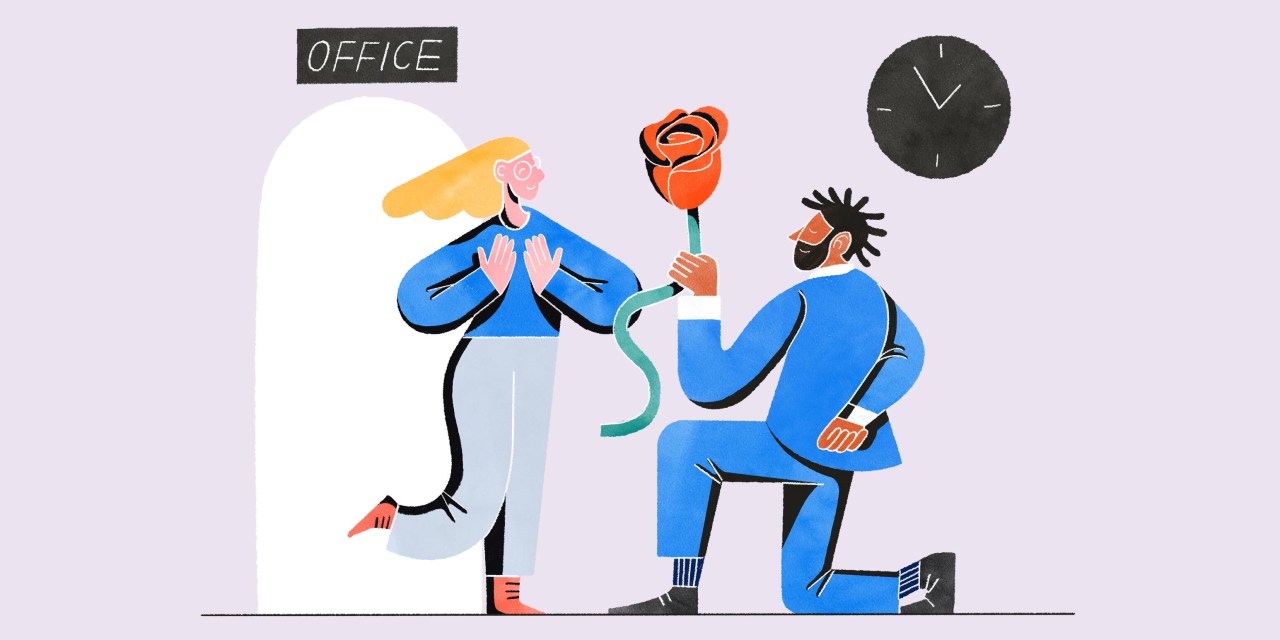Office romances surge amid RTO momentum

Returning to in-person work brings more opportunities for coworkers to socialize, collaborate and build relationships — and not just professional ones. Nearly a third of workers have started a romantic relationship at work after going back to the office, according to a recent survey from Resume Builder including responses from over 1,000 U.S.-based workers. Another 25% say they’ve had a crush on a coworker since coming back to in-person work.
Workplace relationships can sometimes be tricky for organizations to manage and ensure there’s no favoritism or other dynamics impacting individual and team performance, and breakups can be especially hard to navigate. But the excitement of a budding romance or office crush is potentially making the return to in-person work more tolerable and actually appears to have quite a positive influence on one’s workplace experience.
“Maybe you get together for lunch, or you see each other on a break or something like that, but I think it just gives you that serotonin boost throughout the day that not everybody has when they go to work,” said Julia Toothacre, a resume and career strategist at Resume Builder.
The majority of workers currently in a workplace romance say their relationship has a positive impact on their professional lives, according to a survey conducted last month by the Society for Human Resource Management including over 1,000 U.S.-based respondents. About 80% said it boosted their overall mood at work and motivation levels, and it made them feel a stronger sense of belonging and commitment to their organizations.
About 70% of workers in the Resume Builder survey said their new relationship has had a positive impact on their work, with just 6% saying it impacted them negatively.
But those in new RTO relationships aren’t all that eager to share the news. About 60% of workers in new office relationships said they haven’t disclosed it to HR.
Several factors could be driving this, like the fact these are new relationships, but also a lack of awareness around company policies. People might also be reluctant to share simply because they don’t like to share much about their personal life at work. “There are a lot of people I know that have a very hard line about what they’re willing to talk about and disclose at work,” Toothacre said.
More recently some companies have started rethinking protocols and taken steps to make policies more widely known through all-hands meetings or by sharing the information in recurring newsletters.
“Most of us get the handbook and we don’t actually look at it until we have to look at it, or unless HR sent something out specifically about it,” Toothacre said.
Some employers will require staff to sign a disclaimer after disclosing a relationship stating the relationship is voluntary, consensual and won’t impact their job performance to protect the employer legally if the relationship sours and ends up impacting performance or even leads to harassment, said Robyn Hopper, SHRM HR knowledge advisor. That contract can also help reduce perceptions of favoritism by simply making management aware of the situation, she said.
That’s another big reason workers may be hesitant to disclose it with HR — because they’re dating their boss, or their subordinate, and unsure of what happens next. Nearly half of those who entered a romantic relationship at work after returning to the office said it’s been with a superior, according to Resume Builder’s survey.
Company policies typically state that dating between a superior and a subordinate is not allowed, as they typically do bring up real concerns around favoritism and bias, Hopper said. Employers should clarify those to staff, as more workplace romances are expected to continue happening amid dating app fatigue and a growing need for real human connection.
“There’s so much frustration on dating apps, people are sick of swiping, they’re sick of having to meet people on a dating app, and it sounds like people are going back to the way it used to be,” said Connell Barrett, a New York City-based dating coach who works with men and founder of Dating Transformation.
One of the trickiest parts of dating — especially with people you meet online — is finding shared interests and topics to discuss. Dating people from work “takes away one of the biggest stumbling blocks that many single people have, which is not knowing what to talk about and how to verbally connect with that person,” Barrett said.
“Any date to an extent is about two people finding commonalities that can help them come together and connect, and when you are dating or interested in dating a coworker you’ve got built-in commonalities which can kind of grease those wheels,” he said.


